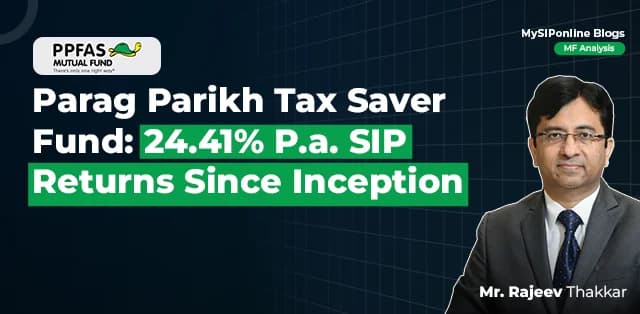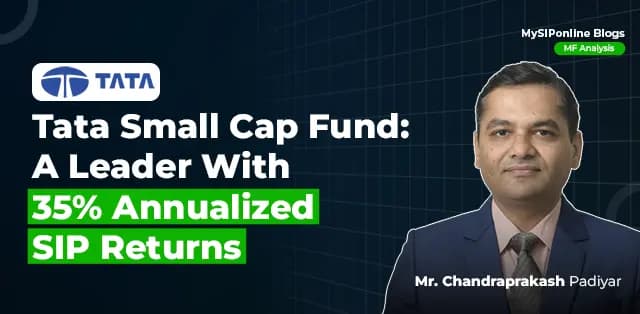Table of Contents
If you are curious to know about a Small Cap Fund, it means you are ready to achieve high returns. If you start a SIP in it, that means you want the perfect combination of high returns with disciplined investment. Let's begin with analysing the 3 and 5-year SIP returns of the top 5 Small Cap Funds to begin your investment journey with.
5 Best Small Cap SIP Returns
| Fund Name | 3 Years CAGR (%) | 5 Years CAGR (%) | AUM (cr) | Minimum Investment | Expense Ratio (%) | Exit Load (%) |
|---|---|---|---|---|---|---|
| Nippon India Small Cap Fund | 37.79 | 39.98 | 50,422.78 | 500 | 1.51 | 1 |
| SBI Small Cap Fund | 25.9 | 29.27 | 27,759.65 | 500 | 1.62 | 1 |
| Quant Small Cap Fund | 40.85 | 48.94 | 20,164.09 | 1000 | 1.71 | 1 |
| Canara Robeco Small Cap Fund | 27.29 | 33.93 | 10,085.98 | 1000 | 1.74 | 1 |
| Bandhan Small Cap Fund | 35.98 | - | 4,994.19 | 100 | 1.84 | 1 |
Detailed Analysis of Best Small Cap Mutual Funds
1. Nippon India Small Cap Fund
Being introduced on September 5th 2010, Nippon Small Cap Fund with 37.79% in 3 years and 39.98% SIP returns in the 5 years has set a remarkable standard for the other Equity Funds in its category. They move smartly by investing in trending companies and making high returns by actively managing their portfolio. With the lowest expense ratio of 1.51%, it has made itself a cost-efficient option for investment. Also, note that the minimum SIP is Rs.500 which makes it accessible to a wide range of investors.
2. SBI Small Cap Fund
With a standing AUM of Rs27,759.65 Crores, the SBI Small Cap Fund has returned 25.9% in the past three years and 29.27% SIP returns in 5 years. This fund is more focused on making high returns in the long term with a buy-and-hold investment approach. You can start a SIP with a minimum amount of Rs500 not worrying much about the cost of investing as the expense ratio which means the fees charged by the fund house is affordable at 1.62%. If the consistency of returns is what you are looking for this scheme is a perfect fit for you.
3. Quant Small Cap Fund
The unique investment approach of right-time buying and right-time exit is what sets the Quant Small Cap Fund apart from its peers. In the last 3 and 5 years, it has given 40.85% and 48.94% SIP returns respectively while maintaining 100% consistency in the portfolio. Although the minimum investment for SIP is Rs1000, the profits are worth every penny invested. Meanwhile, the scheme has a moderate expense ratio of 1.71% attracting a broad range of investors.
4. Canara Robeco Small Cap Fund
The Canara Robeco Small Cap Fund was launched on 5th September 2019, with a good 27.29% in 3 years and 33.93% SIP return in 5 years. This scheme has a standing AUM of Rs10,085 Crores. With a minimum SIP of Rs.1000, it finds a mix between accessibility and commitment, attracting both new and experienced investors.
5. Bandhan Small Cap Fund
With a strong entry in the market, Bandhan Small Cap Fund has generated annualised SIP returns of 35.98% in the last three years. It is launched on 25th February 2020. This scheme follows a top-down approach while selecting stocks and managing its assets with quality. By keeping a minimum SIP of Rs100, it has made it more affordable for investors. This scheme has both the expertise and potential to become the next one of the largest multi-beggar companies in the near future.
Ready to grow your wealth? Take the first and Start your SIP now!
Factors to Consider Before Investing in Small Cap Funds
Investing in small-cap funds can offer substantial growth potential, but it's essential to consider several key factors to ensure they aligns with your investment strategy and risk tolerance. Here are some points you should be paying attention to:
1. Volatility
- Small-cap funds are naturally more volatile compared to large-cap and mid-cap funds.
- The emerging companies in small-cap funds are typically less established and more exposed to market fluctuations.
- This volatility can lead to significant short-term price swings, which may be unsettling for some investors.
- It's important to be prepared for at least 30% of falls and have the risk tolerance to withstand such potential short-term losses.
2. Market Cycles
- Understanding market cycles is vital when investing in small-cap funds. These funds tend to perform well in bullish markets when investor confidence is high, and economic conditions are favourable.
- Conversely, they may underperform during bearish markets or economic downturns.
- An awareness of market cycles can help you time your investments more effectively and manage expectations during different phases of the market.
3. Fund Manager Expertise
- The expertise of the fund manager is a critical factor in the performance of small-cap funds.
- Experienced fund managers with a proven track record can identify promising small-cap companies and manage the fund’s portfolio effectively.
- Assess the fund manager’s experience, investment style, and past performance to ensure they have the skills necessary to navigate the complexities of the small-cap market.
4. Investment Duration
- Small-cap funds require a long-term investment horizon to fully realize their growth potential.
- These companies often need time to mature and expand their market presence.
- Typically, a time frame of 5-7 years or more is advisable to ride out market volatility and benefit from the compounding growth of small-cap stocks.
- Avoid making decisions based on short-term market movements and stay focused on your long-term investment goals.
5. Liquidity
- Liquidity is another important consideration when investing in small-cap funds.
- Small-cap stocks can be less liquid than large-cap stocks, meaning they may not be as easily bought or sold without impacting the stock price.
- This can cause challenges, especially during market downturns when liquidity is typically lower.
- Properly check the liquidity of the small-cap funds you are considering to ensure you can access your investment when needed without significant cost or delay.
For expert market insights and tips, to explore related blogs Click Here.
Who Should Invest in Small Cap Funds?
Let’s check whether this scheme is right for you or not:
- Suitable for long-term investors comfortable with risk: Small cap funds are perfect for those seeking significant capital appreciation and willing to handle market volatility.
- Investors Looking to Enhance Portfolio Returns: These funds are great for investors with diversified portfolios looking to boost potential returns by investing in early-stage companies.
- Investors with well-informed Market Insights: Investors who understand market cycles or high net-worth individuals capable of taking potential losses will find the best small cap Mutual Funds appealing.
- Check Compatibility: Before investing, evaluate your risk tolerance, investment goals, and time horizon to ensure they align with the unique opportunities and risks of small cap funds.
Endnote
If you are thinking of starting SIP in small cap funds, make sure you have at least an investment duration of 5-7 years. Also aligning your goals, and risk tolerance will take you one step closer to financial safety.
Read a more detailed version of the top 5 schemes with a click. Which Small Cap Fund is Best in 2024?




.webp&w=3840&q=75)

.webp&w=3840&q=75)




